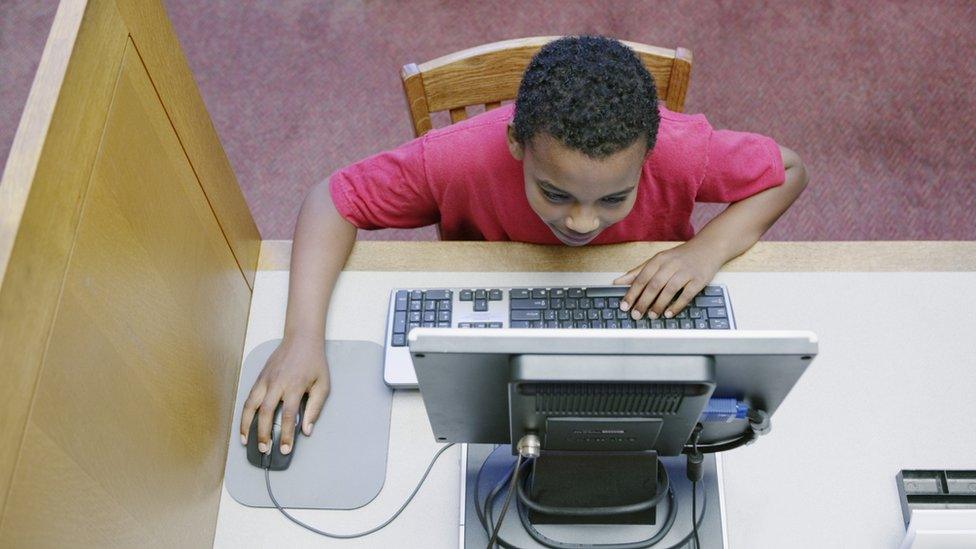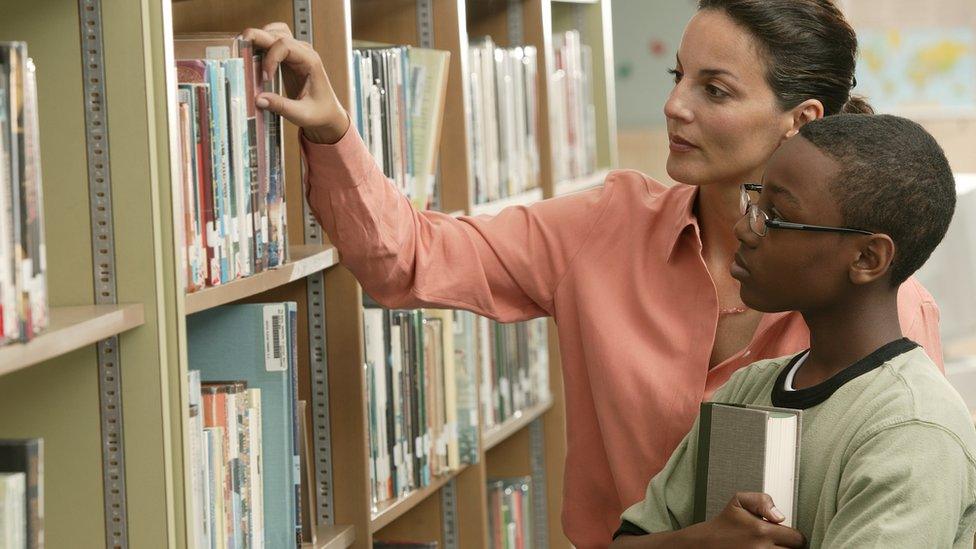Book borrowing figures show library habits are changing
- Published

Many libraries offer people free access to the internet
Almost every part of our lives can now be conducted online, from catching up with friends to applying for jobs.
The same can be said for books, as official figures show the number borrowed from libraries fell in almost every area of England over two years.
Rising use of e-readers, coupled with funding cuts, library closures and reduced book stocks, have resulted in big changes in the borrowing figures recorded by the Chartered Institute of Public Finance and Accountancy (CIPFA).
Councils in the North East and North West of England made up nine of the 10 areas showing the biggest fall in lending between 2012 and 2014, along with the London borough of Camden.
Scale of cuts to libraries unveiled
In Doncaster, where just five libraries are still run by the city council and 19 entrusted to community groups, there were 628,709 book "issues" in 2014, compared with 1.2 million two years earlier.
Nick Stopworth, Doncaster's head of libraries and culture, said: "The aim has been to sustain libraries at a time of huge financial challenge, so that they may ultimately thrive.
"Our e-book usage is slowly increasing. Libraries are being used in new and different ways which reflect community need, shaped by the community. And whilst the numbers of books being issued has fallen, the value for money achieved in terms of cost per loan has improved hugely."
Computer use falls
It is not just the book borrowing that has changed.
There were 96 areas out of 138 where the number of hours clocked up on library computers fell between 2012 and 2014.
Experts suggest it is down to more people being able to use their own smartphones, tablets and laptops to connect to library wi-fi.
Cliff Dalton, head of CIPFA's local government faculty, said: "Libraries aim to provide the services that local people want. Last year Arts Council England funded a major drive to get wi-fi into libraries. In many cases it's likely that library users connect to the internet through their own devices, meaning reduced demand for terminals.
"Libraries have faced £180m cuts in five years. Of course this will reduce services and there are fewer books. However, many councils are testing really innovative ways to run libraries and I'm confident they will remain at the centre of community life for a long time to come."
The London Borough of Barking and Dagenham recorded a 51% fall in computer use, the biggest drop in England.
This compared with a 249% rise in Nottinghamshire over the same period.
A spokesman for Barking and Dagenham council said the authority had reduced the number of computers in the wake of £100m of cuts to its government funding.
The spokesman said: "The number of hours used by the public has been affected by several factors.
"A computer subscription was introduced in 2012 as demand was very high and there was pressure on use of the computers. However, young people under the age of 19 and those over 60 are able to use the facilities for free."
He said the council had "some issues around printing" in 2014 which played a role in falling computer use, adding: "In July 2014 we introduced a free half hour for all users to increase use of the computers and in March 2015 we installed wi-fi in all of our libraries and have seen an increase in people using this service."
Re-modelled
Even though they have had to close libraries, councils still see investing in computer equipment as an important part of the service.
Sefton Council in Merseyside closed seven out of 13 branches since 2010. However, official figures from CIPFA show it went from 6.6 computers per 100,000 people in 2012 to 50.5 by the end of 2014, a rise of more than 665%.
A spokesman for the council explained: "The library service was re-modelled to better suit the needs of our users, including the introduction of free reservations for books, free wi-fi and free access to public computers."

Sitcom writers Caroline and Caitlin Moran say libraries were essential to their early education
Despite the rise of e-readers and smartphones, libraries have been seen as irreplaceable by those who benefited from them growing up.
Times columnist and author Caitlin Moran and her sister Caroline wrote Channel 4 sitcom Raised By Wolves, external and based it on their time as home-schooled teenagers.
Caroline said: "Without Wolverhampton's libraries I'd never have discovered George Orwell, Diana Wynne-Jones, Janet Frame or any of the other authors who've had a huge influence on my life. Most of my early education came from books my family could never have afforded to buy.
"It makes me very sad to think of a generation of young people who won't know the excitement of walking into their local library armed only with huge curiosity and a desire to see the world through someone else's eyes.
"If we think the internet can replace that, we are wrong. It's good for many things (for those who are lucky enough to have access to it, which isn't everyone) but it can't replicate time spent with an excellent book."
- Published29 March 2016

- Published29 March 2016
